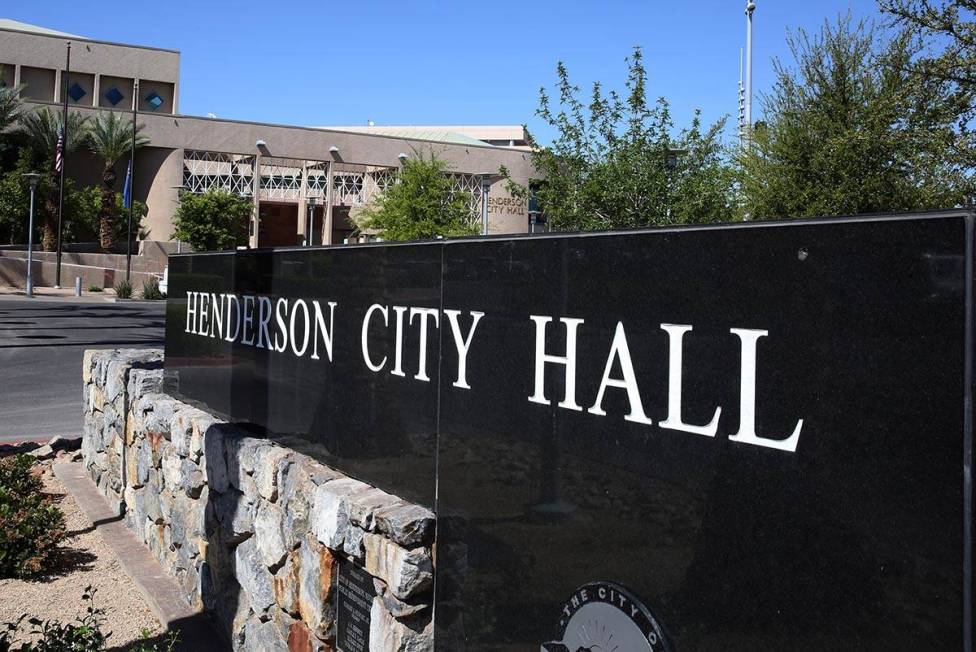Water use in Henderson spiked during 1st months of pandemic, study finds

Water usage in Henderson jumped by more than a billion gallons in the months after the implementation of the COVID-19 stay-at-home order last year, a recent study found.
Researchers at UNLV studied water bills from Henderson homes, businesses and schools from the first four months after the stay-at-home order was announced. The study found that the shift to more people being at home during that time led to roughly 1.1 billion additional gallons of water being used in the city.
“The increase in residential water usage was so large that it overwhelmed that offsetting effect from schools being closed and from commercial buildings being closed,” said Nicholas Irwin, an assistant professor of economics at UNLV and one of the authors of the study.
The findings, Irwin said, underscore the importance of educating new residents on the importance of conservation.
He said he suspects that same type of residential use would apply to the rest of the Las Vegas metropolitan area, but other jurisdictions were not studied.
Researchers studied typical water usage in the three years before the pandemic, Irwin said. They then compared usage after the pandemic to the average of past usage during the same time.
In the first bill after the mid-March stay-at-home order, Henderson experienced a net increase of nearly 48 million gallons of water usage over what would be typical for that time, according to the study.
The second and third bills that were analyzed showed an increase of more than 300 million gallons of additional water usage. In the final bill analyzed, water usage shot up by more than 478 million gallons above normal. Researchers did not analyze bills after mid-July.
Little things add up
Irwin said his team thinks it was the small stuff, such as increased handwashing, that led to the spike in water usage.
“But especially early on, we were really unclear about how COVID-19 was spread, so a lot of us took to maybe washing our groceries and packages coming in,” Irwin said.
More meals at home also meant more dishwashing, which could drive up usage, he said. And children who aren’t thinking about water conservation may have contributed to increased usage, Irwin said.
In one home those little increases don’t make much of a difference. But when factoring homes across all of Henderson, the larger effects are clear.
“It’s a snowball rolling down a hill,” Irwin said. “It’s slowly picking up steam as more and more people are sort of adding to it and extracting water from the system.”
The need for conservation
The study does not differentiate between water that is used one time for things such as landscaping and water that is used indoors, treated and sent back to Lake Mead.
According to Southern Nevada Water Authority spokesman Bronson Mack, about 60 percent of the water in Southern Nevada is used outdoors. This water does not get recycled.
The remaining 40 percent is used indoors, and 99 percent of that is treated and sent back to the lake for reuse, he said.
Overall, one-time water use did spike in Southern Nevada last year, according to the water authority.
“And that’s concerning,” Mack said. “That’s a trend we need to turn around.”
That means keeping a focus on conservation, he said.
Currently, the water authority sees about 50 percent compliance with outdoor watering schedules. If that number were to increase to 65 percent compliance for the watering restrictions that begin in September, Southern Nevada would save 5 billion gallons of water over the fall and winter, he said.
Lake Mead is nearing its first federally declared shortage, which will result in cuts to Nevada’s allocation of Colorado River water. Much of that cut could be made up by the additional compliance.
“With Colorado River shortages expected over the next couple of years, Southern Nevada will have less water available to meet our community’s water demands, so it’s important that we use the water we have as efficiently as possible,” Mack said.
Contact Blake Apgar at bapgar@reviewjournal.com or 702-387-5298. Follow @blakeapgar on Twitter.